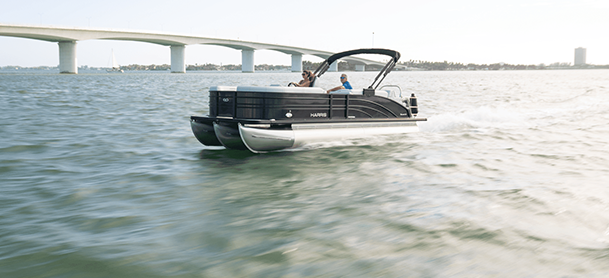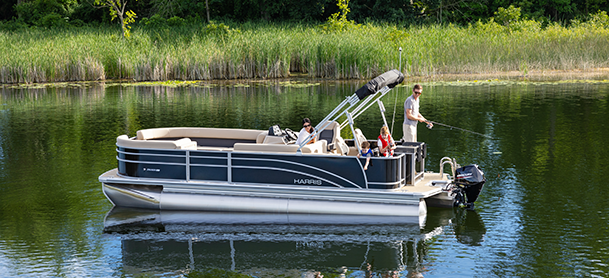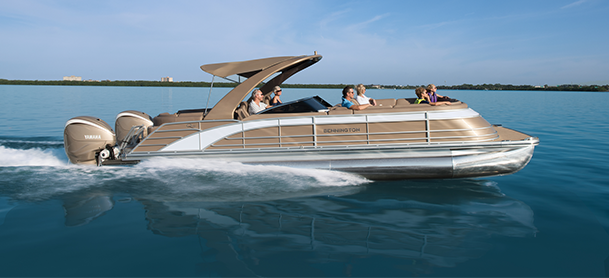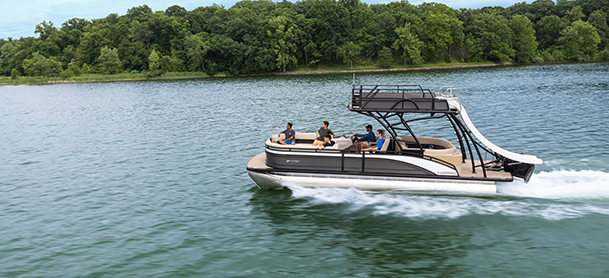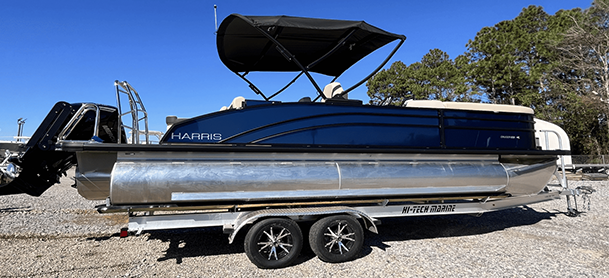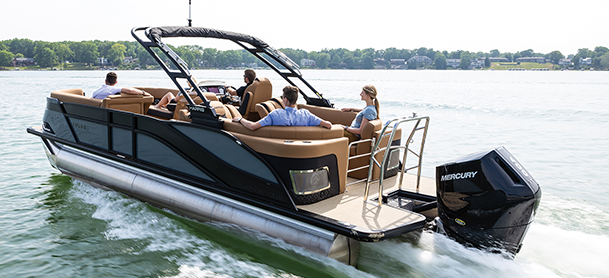Pontoon Buying Guide: Updated for 2025
If you’re in the market for a new boat, you’re probably looking at all your different options and trying to figure out which boat type is best for you. Pontoon boats are a popular choice for boaters, no matter where you are or what your skill level is.
These boats feature an open design that can accommodate a large number of passengers, straightforward controls that make them easy to operate, and are easy to customize to meet your needs.
If you’re trying to decide whether a pontoon is the right choice for you and your boating lifestyle, you’re in the right place. This buying guide will help you learn more about pontoon boats, the different types available, and the benefits of owning one. We’ll also outline what you should know before you buy one and how to find the right model for you.
What is a Pontoon?
A pontoon is a flat-bottomed boat with two or three hollow cylinders attached to the bottom. These tubes are typically made of aluminum and are designed to keep the boat stable and afloat. Pontoons feature wide, open-deck layouts with plenty of seating.
Why is it Called a Pontoon?
Pontoons get their name from the tubes on the bottom of the boat, which are called toons. They may also be referred to as logs, or simply tubes.
A Brief History of Pontoons
For centuries, civilizations have built “boats” using flat surfaces and buoyant tubes. But the design of pontoons, as we know them today, is often credited to a Minnesota farmer named Ambrose Weeres.
In 1951, Weeres built the first-known modern pontoon by attaching two steel barrels to the bottom of a wooden platform. He launched Weeres Pontoons one year later, a company that would go on to sell tens of thousands of pontoons.
Just a few years later, brothers Peter and Ernie Harris launched their own boat company – known at the time as Harris Manufacturing – in their home state of Indiana. Throughout the rest of the 1950s and 60s, their company made significant advances with their boats and achieved several historic feats, including introducing the first pontoons powered by a sterndrive propulsion system.
The company, now known as Harris, makes high-quality pontoons to this day and is still known for its craftsmanship and innovation.
Types of Pontoon Boats
There are many different types of pontoon boats available, each with specific features that make them ideal for certain boating lifestyles and on-the-water activities. Browse through the different pontoon types below to learn more about each.
Tritoons
While standard pontoons have just two tubes on the bottom, tritoons feature a third, often larger tube in the center. This added tube enhances performance, increases stability, and typically makes the boat wider, providing more deck space. Tritoons also tend to be faster than pontoons, so they may be your best option if you like speed. This feature also makes them more suitable for water activities like tubing or water skiing. Learn more about tritoons below.
Fishing Pontoons
Looking for a pontoon that offers comfort and versatility while fishing? A fishing pontoon boat is the perfect solution.
By design, pontoons have more spacious floor plans than many traditional fishing boats, offering functionality for fishing without sacrificing leisure. Some brands, like Bennington, even offer pontoons with layouts specifically designed for fishing.
Fishing pontoons typically come with additional features specifically designed for angling. These can include:
- Fish Stations: Located in the bow or stern of the boat, these stations act as a command center for the fisherman.
- Livewells: These provide an area to safely and securely store live bait or caught fish while you’re on the water, keeping it fresh.
- Rod Lockers: Rod lockers keep your fishing rods safe, secure, and out of the way when you're not using them. They’re crucial for keeping rods secure while the boat is in motion.
- Fishing Seats: Fishing seats can swivel 360 degrees, making it easier to stay seated when you have a fish on the line.
Luxury Pontoons
Luxury pontoon boats are high-end, premium vessels designed to maximize comfort, style, and performance. They feature higher-quality materials, spacious layouts that can accommodate large groups, and enhanced relaxation areas like expanded sun decks. In addition to more high-end designs, these boats usually feature advanced technology, like premium sound and navigation systems. Many luxury pontoon brands – like Bennington, Harris, and Premier – offer highly customizable boat options. This gives you the freedom to design your own floor plans, tailor seating and other furniture, and choose which additional features you’d like to include.
Double-Decker Pontoons
Want to have even more room for fun and relaxation? Double-decker pontoon boats feature a second-level deck that’s accessible from the stern, providing extra space and an additional party area.
These are great boats for entertaining, especially if you have large groups. Double-decker pontoons are also ideal options if you want to accessorize with exciting attachments like water slides.
Despite their added height, double-decker pontoons are just as stable as regular pontoon boats, thanks to their wide base and buoyant toons.
Pontoon Boat Benefits
Regardless of which type of pontoon you’re interested in, these boats come with a wide variety of benefits – from ease of operation to ample storage space.
Stability
Stability is one of the biggest benefits of owning a pontoon. Their wide deck, mostly flat bottom, and buoyant tubes make them much more stable than other boats by design. This also means a smoother ride for you and your passengers.
However, pontoon boats typically aren’t built to handle some of the most demanding conditions found in the open ocean. While modern pontoons are capable of going into the ocean and other large bodies of water, rough seas and big waves can be an issue, especially if your pontoon is on the smaller side.
Capacity
Over the years, pontoons have earned a “party barge” nickname, thanks in large part to the wide, open-deck design. That layout also means these boats usually have more seating space and can fit more passengers than other boat types.
The exact capacity of each boat will vary depending on size, but most standard pontoons can fit between 8 to 12 people. Some larger or more luxurious pontoons may have capacities of 16 or more.
Versatility
Despite that “party barge” reputation, pontoons are actually highly versatile boats. While their design is great for entertaining and leisurely cruising around with friends and family, they can accommodate almost any water activity.
Accessibility
Boarding a boat isn’t easy for everyone – and for some, it may even seem impossible. But while other boats have high gunwales, or sides, pontoons typically have built-in gates that you can use for boarding. That means instead of climbing over the side, you can just enter the boat through the gate.
This feature doesn’t just make boarding easier and safer – it also makes pontoon boats one of the only wheelchair-accessible boat types. If your pontoon isn’t level with your dock or platform, you can even get ramps to help.
Once you’re on board, pontoons also have much more open deck space than other boats, making them more accommodating for wheelchairs.
Perfect for All Skill Levels
Pontoons are great boats, regardless of how much experience you have on the water. But if you’re just getting started with the boating lifestyle, these are generally considered one of the most beginner-friendly boats available.
That’s because most pontoons have very straightforward steering consoles, making them easy to operate and dock. Their stability is also a big draw for beginners who may be looking for a smoother ride.
Budget-Friendly
Like any other type, pontoon boat prices vary. Some manufacturers offer high-end luxury pontoons that will carry a much higher price than your standard, entry-level models.
But with so many model options – and so many used pontoons available through dealers and online marketplaces – it’s relatively easy to find a boat that will fit your budget.
Easy to Maintain
All boats require some level of care and service, and pontoons are no exception. But they are generally considered more low-maintenance than other boat types, thanks to a few different features.
- Gelcoat: Pontoon boats usually don’t have as much of a gelcoat – if they have one at all – that requires maintenance.
- Motor: Most pontoon boats are powered by outboard motors, which are much easier to maintain because they’re external and easy to access.
- Toons: The toons themselves are also very easy to maintain because they’re made from aluminum, which is naturally resistant to corrosion.
Because they’re easy to maintain and service, and built for durability, pontoons typically have a long lifespan. With regular seasonal maintenance and care, these boats can often last 20 or more years.
Highly Customizable
One of the best parts of pontoons is how easy it is to customize them with different accessories. If you’re buying a new pontoon, manufacturers will often work with you to build the right floor plan for your needs. For example, if you want more of an open deck, they may recommend a center walkthrough design. But if you really want to use your boat for entertaining, you may want to choose a layout that offers more seating.
Whether you’re buying new or used, there are a lot of different accessories available that can help you make a pontoon your own. From general accessories like additional seating options and advanced technology to specific items like rod holders and tow bars, you can accessorize and turn any pontoon into your dream boat.
Want to learn more about pontoon benefits? Check out our list of 10 Reasons You Need a Pontoon.
What to Know Before Buying a Pontoon
Now that we’ve covered all the benefits of pontoon boats, let’s take a deeper dive into what you should know before you commit to buying one.
Use the questions below to figure out how to find the right type and model for you, and to learn what to look for when buying a pontoon boat.
How Many Passengers Do You Need Space For?
One of the biggest things you should think about when buying a pontoon is how many passengers you’ll typically have on board. Determining the maximum capacity you need will help you figure out what size pontoon you need.
Several factors impact a pontoon’s capacity, including the length and width of the boat, its layout, and its weight capacity. But you should remember, the overall weight capacity includes more than just your passengers. It’s also the gear and equipment you have onboard.
Because of these different factors, the exact capacity will depend on the specific model, but you can use the chart below as a rough estimate of how many people pontoons can fit based on their size:
| Length | 18 ft | 20 - 21 ft | 22 - 23 ft | 25 - 26 ft | 27+ ft |
|---|---|---|---|---|---|
| Avg. Capacity | 9 people | 10 - 11 people | 11 - 12 people | 13 - 15 people | 16+ people |
| Check This Model Out | 25' Harris Cruiser 190 | 25' Premier 200 Sunscape | 25' Premier 220 Sunscape | 25' Harris Cruiser 250 | 25' Harris Grand Mariner 270 |
Where Are You Going to Use Your Pontoon?
Another important consideration is where exactly you’ll be using your pontoon. Think about whether you’re planning on cruising smaller lakes and rivers or large lakes and bays.
Can Pontoons Handle Chop?
Pontoon boats are versatile, but typically best for calmer waters. While they can handle some chop, you don’t want to venture too far offshore in the ocean, where conditions can be a lot more demanding.
That being said, if you plan on using your pontoon in larger bodies of water that can get pretty wavy, you should choose your boat accordingly. Larger models with bigger engines will handle waves a lot better than smaller pontoons.
Choosing a tritoon may also be a good choice, because that third toon will give you more stability.
Can You Use a Pontoon in Saltwater?
This will really depend on the age and model of your boat. While they’ve long been considered freshwater boats, a lot of modern pontoons are built to handle saltwater – with the right care and maintenance.
Exposure to salt can impact just about any boat, including pontoons. You’ll need to take steps to mitigate that exposure and prevent corrosion. Keeping your boat clean and rinsing it regularly with freshwater will help. Using sacrificial anodes can also protect your boat parts.
Are You Docking or Trailering Your Pontoon?
Some boaters prefer keeping their vessel in the water, docked at a marina throughout boating season. Others would rather trailer their boat to and from the water each time they use it.
Before you decide to buy a pontoon, you should think about which method you’d prefer. Pontoons can be heavier and wider than other boat types, so if you want to trailer it, you’ll need to make sure you have the right equipment.
Pontoon Trailers
First, you’ll need to have the right trailer. Depending on which model you choose, you’ll need a scissor trailer or a bunk trailer.
A scissor trailer is more compact, and lifts your pontoon from the center, between the toons. These trailers won’t work if you have a tritoon, but they are easier to store when they’re not being used.
Bunk trailers, on the other hand, slide under the hull of your boat and lift the toons using two bunks. These trailers can be a little more difficult to get your boat on, but are more stable than scissor trailers, making them ideal for longer drives.
The Right Vehicle for Towing
In addition to your trailer, you’ll need to check that the vehicle you’re towing the boat with can handle the weight. Check your vehicle towing capacity to ensure you’re in a position to safely trailer your boat to and from the water.
How Are You Going to Use Your Pontoon?
Deciding how you’re going to use your pontoon will also help you find the right model for you. Pontoons are versatile and can be used for a lot of different activities out on the water.
But if you have a specific activity in mind that you’ll be taking part in most of the time – whether it’s fishing, cruising and entertaining, or tow sports – you should take that into consideration.
Your preferred boating lifestyle will help you decide what kind of floor plan you should look for in a pontoon, how much seating you need, and what kind of features you’ll want. For example, you may want extra storage and seating if you plan on entertaining a lot. But if you’re mostly interested in fishing, you should find a pontoon with rod holders and live wells.
Is Speed Important to You?
Some boaters have a need for speed, and love opening up the throttle (while abiding by speed limits, of course.) They may even want to get their adrenaline pumping with some high-intensity water sports.
If that’s the kind of boating lifestyle you’re looking for, a pontoon may not be your best option. Pontoons aren’t typically known for their ability to reach high speeds. Standard pontoons can usually only reach about 18 to 30 mph.
If you definitely want a pontoon boat but still want to get a little more speed, you could consider a tritoon, which is typically faster. You could also pay more for a high-performance model, which usually has a larger engine that can reach 40-50 mph.
Are You Buying New or Used?
If you’ve officially decided you want to buy a pontoon, the last thing you need to choose is whether you’re going to buy new or used.
Buying Used
If you’re on a budget, buying a used boat is an easy way to save some money – as long as you ask the right questions.
You’ll want to closely examine the boat before you buy it, especially if you’re purchasing from an online marketplace. Make sure you ask how many hours are on the engine, check the condition of the interior, and see that all the electrical systems work. You’ll also want to inspect the toons closely for any damage or cracks, because these can be expensive to repair.
Buying New
Buying a new boat is typically more expensive, but comes with peace of mind you probably won’t get when buying used.
If you plan on buying new from a boat dealer, you should make sure you ask about warranty options, financing, and what services the dealer offers.
Other Costs to Consider
Whether you’re buying new or used, you should keep in mind that the actual pontoon is just one of the costs you’re looking at. You’ll also be paying for insurance, service and maintenance, accessories, and fuel for the boat.
Depending on where you live, you may also need to factor in the cost of storage and winterization services.
What Are Some High-Quality Pontoon Boat Brands?
Harris
Harris pontoons were some of the first on the market back in the 1950s. As a pioneer in the industry, Harris will always deliver a premium boat so you can have a great day on the water.
Bennington
Bennington pontoons offer a mix of increased speed and handling, without reducing comfort on the boat. Whether you're cruising or entertaining, Bennington ensures every moment on the water is enjoyable.
Premier
Premier pontoons are known for their distinctive design, creating a luxurious experience. Premier also demonstrates its commitment to the environment by supporting Atlantic Invasive Species prevention.
Crest
Crest pontoons have been a mainstay in the pontoon industry for over six decades. They prioritize durability in their product and take pride in their customers enjoying their time spent on the water.
Sylvan
Sylvan pontoon boats specialize in crafting luxurious boats that are built for performance. Looking to wow your friends with the layout of your boat? Sylvan is the brand for you.
Must-Have Pontoon Accessories (and Nice-to-Haves)
Once you have your pontoon boat picked out, it’s time to accessorize!
First, there are several must-have accessories. These are your mandatory safety items, like fire extinguishers and life jackets. After you have those, you can think about your nice-to-have accessories, like high-tech sound systems and slides.
Must-Haves
- Life Jackets: You need one for each person on the boat. Children under the age of 13 are required to wear one whenever the boat is underway, or not anchored.
- Fire Extinguisher: You’re required to have at least one extinguisher labeled “Marine Type – USCG Approved.”
- Flares: In case of emergency, you need to have a way to signal for help. Flares and other distress signals should be kept readily available on your boat.
- Anchor: Your anchor secures the boat in one place when you want to stay put safely and comfortably. Be sure to choose the right spot so your anchor stays secure.
- Fenders and Bumpers: These will protect your pontoon when docking, preventing your boat from bumping up against the dock. You’ll also need these if you want to tie up to another boat.
- Dock Lines: You’ll need these ropes when you’re docking, and will use them to secure your boat in the water when you’re not using it.
- First-Aid Kit: No matter how short your trip is, a first-aid kit is essential. Accidents happen, and a first-aid kit ensures you’re prepared and equipped to mitigate injuries until you’re back on land.
Check out our Go Boating Kits for MarineMax customers.
Nice-To-Haves
- Water Slide: What’s more fun than a water slide? A water slide on your boat. Double-decker pontoons have space on the top deck to attach a slide. But if you just have one deck, there are low-profile, inflatable slides available that are just as fun.
- Sound Systems: What’s a party without music? Sound systems let you connect your phone via Bluetooth to enjoy your favorite playlists while you’re out on the water.
- Bimini Tops: If the sun gets too intense, a bimini top will protect you and your passengers from the rays.
Ready to Get on the Water in a Pontoon?
Whether you’re looking for a family-friendly boat you can take out for leisurely cruises or a floating entertainment center for parties out on the water, pontoons are a great choice for almost any boating lifestyle. With so many different models available, and customization options, it’s easy to find a pontoon that meets your needs – and your budget.
If you’re ready to get out on the water in a pontoon boat, check out our inventory of new and used pontoon boats for sale at your nearest MarineMax store.
Pontoon Boat FAQs
A pontoon boat engine typically lasts 1,500 to 3,000 hours with proper care and maintenance. That translates to roughly 15-20 years. Engines exposed to freshwater generally last longer than those in saltwater.
Pontoon boats often hold their value better than traditional V-hull boats. The exact value will depend on your boat’s specific make, model, and year. But keeping up with regular maintenance and preventative services will help hold that value.
You can buy them year-round, but the best time of year to buy a pontoon boat is usually the fall season. That’s when pontoon boat dealers look to clear out their inventory so they can make room for new models. This often means they’ll offer good deals on older models.
There are two main types of pontoon boat trailers:
Scissor-Style:
A single center rail lifts the boat between the pontoons. These are best for shallow water launches and at-home storage.
Bunk-Style:
Two bunks cradle each pontoon tube individually. These provide stability and are best for highway towing and long-distance travel.
Pontoons and catamarans are often confused, likely because catamarans have a twin-hull design that could resemble the toons on a pontoon. But these boat types serve very different purposes and have distinct features.
Catamarans are much larger and more luxurious, with multiple rooms for sleeping and living. They also come with a significantly higher price tag and more complex maintenance.
Pontoons, on the other hand, are more commonly used for recreational activities like cruising, fishing, and watersports. They’re more affordable, easier to maintain, and far more common.
Pontoons and deck boats are often misconstrued as well, because they share a similar look and offer comparable on-water experiences. Both feature an open design that allows for ample seating at the front of the boat, making them great for socializing.
However, the main difference is in their hull structure. A deck boat has a V-shaped hull while a pontoon has a flat bottom with two or three tubes, offering superior stability.

